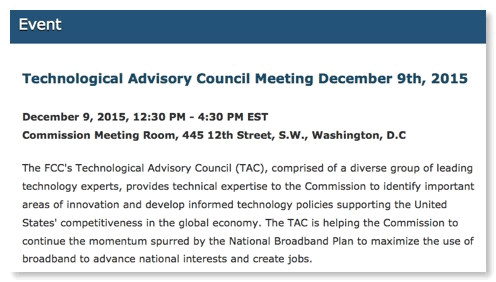FCC Technological Advisory Council: Why Is It Having a Meeting in the Middle of the Major Communications Technology Conference?

The above announcement appears on the FCC's website yesterday. I looked at it and said to myself "Isn't something else going on in the communications technology area that week?" Oh, Yes!

This is the major communications technology conference in the USA and covers a wide variety of specialties, unlike the NAB and CTIA conventions dealing with specific industries that are a "must go" for all FCC commissioners and most senior managers. But Globecomm is also the only major technical conference to attract a sitting FCC commissioner in recent years: Comm Rosenworcel spoke in 2013 saying:
"It is a treat to be able to join you because the IEEE Communications Society is an important force in the innovation economy. You are working on some of the most cutting-edge issues in communications from the development of LTE and dynamic spectrum access to the coming Internet of Things. Plus, the work you do supports our work at the Federal Communications Commission. But it has been too long since a Commissioner has visited with you for this conference. So I decided it was time and made the trek to Atlanta today."
The FCC’s Technological Advisory Council is described on the FCC website as follows:
The FCC’s Technological Advisory Council (TAC) provides technical advice to the FCC. The TAC is organized under the authority of the Federal Advisory Committee Act. The current TAC, which is the FCC’s 5th Technological Advisory Council, was formed on October 21, 2010. The TAC is comprised of a diverse array of leading experts that helps the FCC identify important areas of innovation and develop informed technology policies supporting America’s competitiveness and job creation in the global economy.
Sp why are few, if any of the TAC's "diverse array of leading experts" attending the country's major communications technology conference? Perhaps look at the list of members. Many are indeed distinguished such as cell phone pioneer Marty Cooper who has both the major peer recognition for techies: Marty is both an IEEE Fellow and a member of the National Academy of Engineering. But how many of the TAC members have either of these major peer recognitions? Such peer honors are not the only recognition of being a skilled expert, for example younger superstars tend not to be recognized quickly as both programs focus more on sustained achievement. But I don't think that is the reason that most TAC members have neither honor.
When FCC originally formed the TAC around 2000 it had a choice under the Federal Advisory Committee Act of either a group representing specific entities or a group of independent technical experts without conflicts of interests. In the first case the members did not have to be paid for either their time or expenses. In the perpetually under budgeted FCC this was appealing and it is why the table of TAC members clearly has a column labelled "Representing" that shows which entity each member presents. Thus Microsoft, Cisco, AT&T, Comcast, CEA/CTA, Google, Amazon, Qualcomm, Facebook, Motorola, Time-Warner, and Verizon all have their "representatives". But it is for this very reason that FCC can not ask its TAC key technical policy issues analogous to one that NRC, EPA, and FDA can ask their technical advisory committees: the membership have hopeless conflicts of interests and can only deal with generalities.
So you got no TAC input on GPS/LightSquared and don't expect any on the complex Wi-Fi/LTE-U controversy or even on how to solve ongoing stubborn interference problems such as the recurring interference to 700 MHz LTE base stations from FM broadcast station harmonics that both FCC and CTIA are trying to "sweep under the carpet" to avoid distractions to the incentive auction.
The current TAC performs a genuinely useful function, but it is not its purported function! it efficiently collected the viewpoints of major regulatees to key long term policy issues. But is it not helping FCC address its major spectrum policy decision throughput shortfall because, as now structured, it can't address most issues.
The IEEE-USA recommendations to FCC for improving spectrum policy urged the following:
FCC and NTIA should supplement their existing Technological Advisory Council (TAC) and Commerce Spectrum Management Advisory Committee (CSMAC), which consist mainly of representatives of major communications firms, with a new advisory committee that serves both agencies and focuses on independent review of options for resolving spectrum conflicts and identifying outdated policies. The new group should be modeled on the EPA Science Advisory Board and the NRC Advisory Committee on Reactor Safeguards and members should have the necessary security clearances to deal with issues involving classified federal government spectrum users, if so requested.
While this option would cost money, sharing a purely technical committee between FCC and NTIA would spread the costs and let the leadership of both agencies get both the best techies and independent timely option for resolving complex spectrum policy issues. I also suspect such a joint committee would not schedule meetings during major technical conference, because many of its members would be attending.



![Validate my RSS feed [Valid RSS]](valid-rss-rogers.png)

